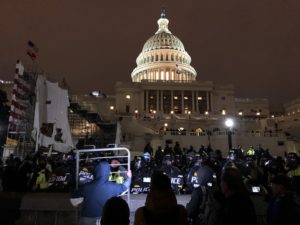The former US President Donald Trump has once again managed to stop the Capitol Riot Committee from accessing his White House Documents. It seems like lady luck is on Trump’s as another ruling was made, which halted the decision to hand over the documents to the investigating committee.

In Washington, a federal judge ruled that Trump White House documents were to be handed over to the committee by Friday this week. In delivering the ruling against Trump, Judge Tanya Chutkan said, “His position that he may override the express will of the executive branch appears to be premised on the notion that his executive power ‘exists in perpetuity’… but presidents are not kings, and plaintiff is not president” [Source].
She explained that “The court holds that the public interest lies in permitting – not enjoining – the combined will of the legislative and executive branches to study the events that led to January 6”. Chutkan’s ruling for the select committee was rolled out in a 39-page document given to the legal teams [Source].
Trump’s legal team promised to take action against this ruling, and it looks like they managed to sway the laws to their side. A federal appeal propagated by this team led to a granted Trump’s request to pause “the release of key White House records from his presidency to the House select committee investigating the January 6 attack on the US Capitol, as he appeals a lower court’s decision that he can’t claim executive privilege to keep them secret” [Source].

The US Court of Appeals for the DC Circuit handled Trump’s appeal. The panel consisted of three judges appointed by the Democrats, namely Patricia Millett and Robert Wilkins, who Obama appointed, and Ketanji Brown, who is a Biden appointee. News reports state that the judges “issued the temporary injunction in response to Trump’s last-ditch effort ahead of a Friday deadline to turn over an initial batch of 46 records, including White House calls logs, visitor logs, drafts of speeches and three handwritten memos from Trump’s then-chief of staff, Mark Meadows.”
The House Committee is quite determined to access those files and requested them by saying, “The potential harm to the public is immense: Our democratic institutions and a core feature of our democracy – the peaceful transfer of power – are at stake.” It explained that any delay in getting the documents would be problematic in trying to “timely complete comprehensive investigation and recommend effective remedial legislation.”
The proceedings on this case depicted that the panel requested lawyers for Trump, Congress, and the Biden administration to hand in briefs and hear their oral arguments on November 30. A two-page order was released, which stated that “The purpose of this administrative injunction is to protect the court’s jurisdiction from addressing appellant’s claims of executive privilege and should not be construed in any way as a ruling on the merits.”
If Trump’s appeal had been rejected, then he was “expected to appeal to the supreme court through its ‘shadow docket,’ which allows justices to quickly decide emergency matters without full briefs and arguments” [Source]. Political analysts noted how Trump shows prowess in evading the law by filing numerous appeals and making delays. Carl Tobias, Williams chair in law at the University of Richmond, Virginia, commented on these sneaky tactics by Trump and said, “Trump’s entire effort appears to be right out of his playbook. Trump obstructs and delays in apparent attempts to prevent the Congress and the courts from discharging their constitutional duties.”
He also explained that “In this, as in so many other prior gambits, Trump apparently wants to run out the clock in the hopes that the 2022 elections will yield GOP House and Senate majorities that will halt congressional investigation of his role in the January 6 insurrection.”
The Capitol riots resulted in a significant amount of property and life loss, necessitating appropriate action. The House Committee is in pursuit of delivering that justice. And Trump is exerting effort in defending himself; thus, the November 30 hearing promises to be a heated confrontation in US court.







































